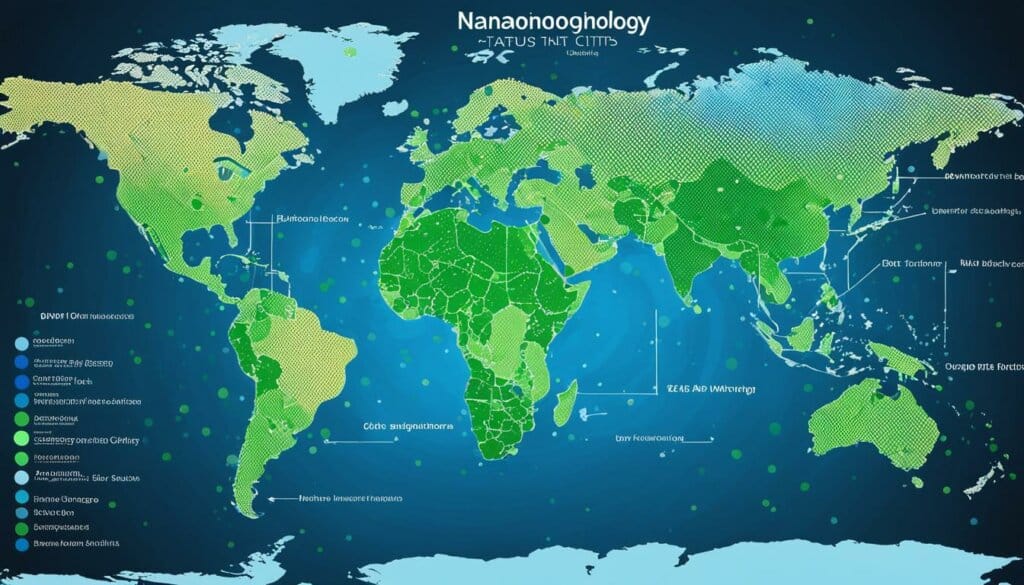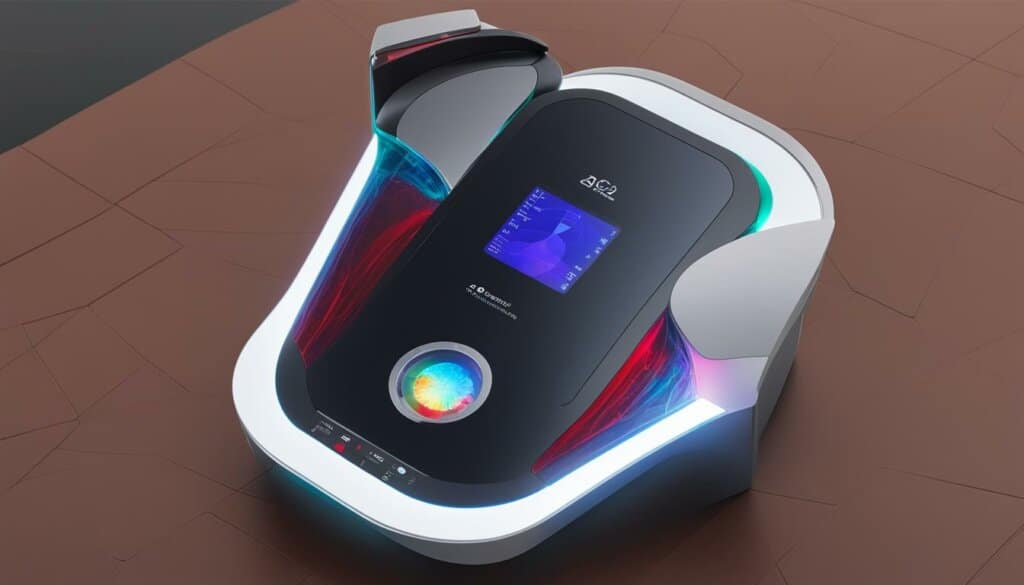Table of Contents
Nanotechnology is a game-changer in various industries, revolutionizing healthcare, manufacturing, energy, and more. By manipulating materials at a nanoscale, nanotechnology companies are pushing the boundaries of innovation and creating groundbreaking solutions. In this article, we delve into the top nanotechnology applications and innovations of leading nanotechnology companies, providing a glimpse into the transformative power of nanotech on a global scale.
But first, let’s understand the basics. Nanotechnology involves working with materials at the nanoscale, where one nanometer is equivalent to one billionth of a meter. At this scale, materials exhibit unique properties and behaviors, which can be harnessed to enhance performance, improve efficiency, and drive sustainability across industries.
From targeted drug delivery and diagnostic tools to manufacturing advancements and energy solutions, nanotechnology is making a profound impact. Join us as we explore the groundbreaking innovations of leading nanotechnology companies and uncover the limitless possibilities that nanotechnology offers for the future.
Key Takeaways:
- Nanotechnology is revolutionizing industries across the board, enhancing material properties and driving innovation.
- Leading nanotechnology companies are pioneers in developing solutions for healthcare, manufacturing, energy, and more.
- By manipulating materials at the nanoscale, nanotechnology companies create products with improved performance and sustainability.
- Nanotech applications range from targeted drug delivery and diagnostic tools to manufacturing advancements and energy solutions.
- The future of nanotechnology holds immense potential for transforming various industries and shaping a sustainable world.
Top Nanotechnology Applications across Industries
Nanotechnology offers a multitude of applications that are transforming various industries. From healthcare to manufacturing, energy to the environment, nanotech is revolutionizing material properties and improving the efficiency of numerous processes.
Healthcare
In the healthcare industry, nanotechnology plays a crucial role in improving diagnostics, drug delivery, and wound care. By leveraging nanoscale materials and devices, healthcare professionals can enhance disease detection, target specific areas for drug administration, and develop advanced wound dressings that promote faster healing.
Manufacturing
In the manufacturing sector, nanotechnology is used to enhance material performance and functionality. By manipulating materials at the nanoscale, manufacturers can improve strength, durability, and other desirable properties. Nanomaterials, such as carbon nanotubes, are incorporated into products to create lightweight and high-performance components.
Energy
Energy companies are harnessing nanotechnology to improve energy production processes and reduce environmental impact. Nanomaterials are utilized to enhance the efficiency of solar panels, increase energy storage capacity, and optimize fuel cell performance. These advancements contribute to a more sustainable and cleaner energy future.
Chemical Industry
The chemical industry benefits from nanotechnology in optimizing chemical synthesis processes and improving product performance. Nanocatalysts enable more efficient and selective chemical reactions, leading to reduced waste and increased yield. Nanoparticles can also enhance product properties, such as UV resistance in coatings and increased reactivity in catalysts.
Climate and Environment Solutions
Nanotechnology plays a vital role in addressing climate and environmental challenges. By developing innovative nanomaterials, researchers are creating sustainable solutions for water filtration, air purification, and waste remediation. Nanotech-enabled approaches offer more efficient and cost-effective methods to tackle environmental issues.
Biotechnology
Advancements in nanotechnology are revolutionizing the field of biotechnology. Nanoparticles and nanodevices enable targeted drug delivery, gene editing techniques, and precise disease detection. These technologies hold the potential to improve personalized medicine and transform the way we understand and treat various diseases.
By exploring the top nanotechnology applications across industries, we can gain insights into the transformative potential of nanotech and its role in shaping the future.
Global Startup Heat Map of Nanotechnology Startups
The global nanotechnology startup ecosystem is experiencing remarkable growth, particularly with a concentration of startups in Western Europe and the US. These innovative companies in the field of nanotechnology are revolutionizing industries and transforming the future with their cutting-edge solutions and technologies. Through an in-depth analysis of 1093 nanotechnology startups and scale-ups, we offer valuable insights into the global distribution of these companies.

By examining the geographical presence of nanotechnology startups, we can identify key regions and countries that serve as hotspots for these groundbreaking ventures. The following table provides an overview of the top 10 countries with the highest number of nanotechnology startups:
| Rank | Country | Number of Nanotechnology Startups |
|---|---|---|
| 1 | United States | 367 |
| 2 | Germany | 183 |
| 3 | United Kingdom | 151 |
| 4 | France | 109 |
| 5 | Netherlands | 66 |
| 6 | Sweden | 59 |
| 7 | Switzerland | 56 |
| 8 | China | 50 |
| 9 | Canada | 46 |
| 10 | Israel | 44 |
These countries boast vibrant nanotech startup ecosystems, fostering innovation and entrepreneurial spirit. However, it’s important to note that nanotechnology startups are emerging across the globe, with promising ventures in other regions such as Asia and the Middle East gaining momentum.
“The concentration of nanotechnology startups in Western Europe and the US signifies the strong support and investment in this field, enabling the development of groundbreaking technologies that have the potential to reshape industries.”
Now, let’s take a closer look at a selection of ten promising nanotechnology startups that are making significant waves in the industry:
- Company A – Specializing in advanced nanomaterials for energy storage.
- Company B – Developing nanotech-enabled devices for personalized medicine.
- Company C – Pioneering nanosensors for environmental monitoring applications.
- Company D – Creating nanotechnology solutions for water purification and desalination.
- Company E – Utilizing nanofabrication techniques for next-generation electronics.
- Company F – Focusing on nanomedicine for targeted drug delivery.
- Company G – Innovating in the field of nanoelectronics for high-performance computing.
- Company H – Advancing nanomaterials for sustainable construction and infrastructure.
- Company I – Revolutionizing the agricultural industry with nanotech-based precision farming.
- Company J – Developing nanomaterials for lightweight and fuel-efficient transportation.
These startups are pushing the boundaries of nanotechnology and offering groundbreaking solutions across various sectors, paving the way for a more sustainable and technologically advanced future.
Healthcare Innovations in Nanotechnology
In the healthcare industry, nanotechnology is revolutionizing the way we diagnose and treat diseases. With the ability to manipulate materials at a nanoscale, nanotech-based diagnostic tools and devices offer incredible precision and targeted treatment options. These advancements are transforming healthcare for the better, improving patient outcomes and revolutionizing medical practices.
One notable area where nanotechnology is making a significant impact is in disease detection. Nanotech-enabled diagnostic tools, such as cantilevers and nanobots, provide highly accurate and reliable disease detection, enabling early interventions and personalized treatment plans. The precise targeting offered by nanotechnology ensures that treatment is delivered directly to affected areas, minimizing damage to healthy tissues and improving the overall effectiveness of therapies.
But nanotechnology doesn’t stop there – it is also revolutionizing wound care and surgical procedures. Nanotech-enhanced wound dressings provide better healing properties, promoting faster recovery and reducing the risk of infections. Surgical textiles embedded with nanomaterials offer improved antimicrobial properties, reducing the chances of post-operative complications. And nanotech implants are enhancing biocompatibility, ensuring better integration with the body and reducing rejection rates.
Remote patient monitoring is another area benefiting from nanotechnology. Nanotech-enabled wearables are allowing healthcare providers to monitor patients remotely, collecting vital data that can be analyzed in real-time. This technology opens up new possibilities for managing chronic conditions, ensuring early intervention, and providing personalized care to patients without the need for frequent visits to medical facilities.
There are several nanotechnology startups at the forefront of healthcare innovation. One such example is Poly-Dtech, a company that specializes in developing nano molecule biomarkers for pathology and medical imaging diagnosis. Their cutting-edge research and innovative solutions offer promising prospects for improving disease diagnosis and monitoring. The use of nano molecule biomarkers has the potential to revolutionize medical imaging and provide more accurate and reliable diagnostic information.
Examples of Nanotechnology Innovations in Healthcare
| Startup | Innovation |
|---|---|
| Poly-Dtech | Development of nano molecule biomarkers for pathology and medical imaging diagnosis |
| Gisens Biotech | Portable testing devices with nano-enabled biosensors for rapid and precise medical tests |
Nanotechnology is set to continue revolutionizing healthcare, offering new possibilities for disease detection, targeted treatment, and patient care. As further research and development take place, we can expect even more groundbreaking innovations that will shape the future of healthcare.
Advancements in Chemical Manufacturing with Nanotechnology
Nanotechnology is revolutionizing the field of chemical manufacturing by enhancing material performance and improving cost-effectiveness. By engineering the nano and microstructures of molecules, chemical manufacturers can precisely control the performance and properties of their products, unlocking a whole new level of innovation and efficiency. One of the remarkable applications of nanotechnology in chemical manufacturing is the development of nanocarbon-based additives that significantly enhance material characteristics such as strength, weight, and electrical conductivity.

These industrial nanocarbon-based additives are paving the way for improved product performance in a wide range of sectors including aerospace, automotive, electronics, and more. Companies like Nemo Nanomaterials have pioneered the development of nanocarbon-based additives that bring about transformative changes in material properties, creating lighter and stronger materials that can withstand extreme conditions.
The innovative nanocarbon-based additives developed by Nemo Nanomaterials offer a range of benefits:
- Enhanced Strength: By incorporating nanocarbons into materials, the strength and durability are significantly improved, enabling the development of lightweight yet robust products.
- Weight Reduction: Nanocarbon additives reduce the overall weight of materials without compromising on strength, making them ideal for applications where weight saving is crucial.
- Improved Electrical Conductivity: Nanocarbon-based additives enhance electrical conductivity, opening up opportunities for more efficient energy transmission and storage systems.
- Enhanced Thermal Conductivity: These additives also improve thermal conductivity, allowing for better heat dissipation and thermal management in various applications.
- Customizable Performance: Nanocarbon-based additives can be tailored to specific requirements, offering a high degree of customization in terms of material performance and functionality.
With nanotechnology enabling the production of these advanced additives, chemical manufacturers are empowered to meet the evolving demands of industries that rely on high-performance materials. By harnessing the incredible potential of nanocarbon-based additives, they can unlock a world of possibilities and drive innovation in various sectors.
Nanotechnology Innovations in Manufacturing
Nanotechnology is revolutionizing the manufacturing sector, allowing for remarkable advancements in product performance and quality. By developing industrial materials and chemicals at the nanoscale, manufacturers can unlock new possibilities and create materials with enhanced properties.
One key area where nanotechnology is making a significant impact is in the production of nanomaterials. Carbon nanotubes, for instance, are widely utilized in manufacturing to create products that are lightweight yet exceptionally durable. These nanotubes have remarkable strength-to-weight ratios, making them ideal for applications that require both strength and flexibility. By incorporating carbon nanotubes into composite materials, manufacturers can produce high-performance products that meet the demands of various industries.
Nemo Nanomaterials is one of the key players in the field of nanomanufacturing. This innovative startup specializes in industrial nanocarbon-based additives that enhance material properties for a wide range of applications. Their expertise lies in tailoring the nanomaterial composition and structure to achieve specific performance goals, such as improved conductivity or increased mechanical strength. By incorporating these nanocarbon-based additives into manufacturing processes, companies can achieve remarkable improvements in their final products.
The table below highlights some of the key advantages of utilizing nanotechnology in manufacturing:
| Advantages of Nanotechnology in Manufacturing |
|---|
| Enhanced strength-to-weight ratio |
| Improved thermal and electrical conductivity |
| Enhanced material durability and flexibility |
| Greater corrosion resistance |
| Improved product performance and lifespan |
Nanotechnology startups are pushing the boundaries of what is possible in manufacturing. These companies are leveraging nanomaterials and nanoscale engineering techniques to introduce groundbreaking innovations that cater to the needs of various industries. As manufacturers continue to embrace nanotechnology, we can expect to see more advanced and sustainable products that contribute to a greener future.
Nanotechnology’s Role in Climate and Environment Solutions
Nanotechnology is at the forefront of addressing climate and environmental challenges, offering innovative solutions to promote a greener future. This field plays a vital role in reducing carbon emissions, improving energy efficiency, and developing sustainable water filtration systems.
One key aspect of nanotech’s contribution to environmental sustainability is the development of sustainable water filtration systems. Companies like Aavalor GreenTech are utilizing nanotechnology and graphene to filter and purify water, offering sustainable solutions for industrial waste purification and large-scale desalination. By harnessing the unique properties of nanomaterials, these systems can effectively remove contaminants and ensure a safe and reliable water supply.
Nanotech-enabled Water Filtration Benefits:
- Efficient Contaminant Removal: Nanotechnology allows for the precise removal of contaminants, such as pollutants and microorganisms, ensuring clean and safe water for various applications.
- Enhanced Filtration Performance: The use of nanomaterials enables improved filtration efficiency and increased water flow rates, ensuring optimal system performance.
- Energy Efficiency: Nanotech-based filtration systems require less energy compared to traditional methods, reducing the carbon footprint while providing effective water treatment.
- Scalability and Versatility: Nanotechnology offers scalability and adaptability, making it suitable for various water treatment applications, from small-scale industrial purification to large-scale desalination projects.
In addition to water filtration, nanotechnology plays a crucial role in other environmental initiatives. By reducing carbon emissions and improving energy efficiency, nanotech solutions contribute significantly to mitigating the impacts of climate change.
“Nanotechnology has immense potential in addressing global environmental challenges. It opens up new possibilities for sustainable solutions, from clean energy production to effective waste management.” – Dr. Emma Thompson, Environmental Scientist
Energy Efficiency and Carbon Reduction:
Nanotechnology offers opportunities to enhance energy efficiency and reduce carbon emissions across multiple industries, such as transportation, manufacturing, and power generation. Nanostructured materials and coatings can improve energy storage and conversion, allowing for more efficient energy use.
Advancements in Environmental Sensing:
Nanotech-enabled sensors play a crucial role in monitoring and detecting environmental pollution. These sensors can detect and measure pollutants, providing real-time data for better environmental management and decision-making processes.
In conclusion, nanotechnology’s applications in climate and environmental solutions are diverse and impactful. Whether it’s sustainable water filtration, energy efficiency, or environmental sensing, nanotech solutions have the potential to drive positive change and create a greener future for generations to come.
Nanobiotechnology Advancements in Biotech
Nanobiotechnology, the fusion of nanotechnology and biotech solutions, is paving the way for significant breakthroughs in disease detection, drug delivery, and gene editing. By harnessing the power of nanoparticles coated with biomolecules, researchers are able to achieve targeted drug delivery and increased bioavailability, maximizing the efficacy of treatment options.
One notable startup leading the charge in nanobiotechnology is Gisens Biotech. Recognizing the potential of nanotechnology, Gisens Biotech is developing portable testing devices that leverage nano-enabled biosensors. These devices enable rapid and precise medical tests, empowering healthcare professionals to make informed decisions quickly.
This nanobiotechnology innovation has the potential to revolutionize the biotech industry, providing accurate diagnostics and personalized treatments for patients around the world. The development of portable testing devices equipped with nano-enabled biosensors represents a significant leap forward in healthcare, bringing advanced diagnostic capabilities directly to the point-of-care.
The Role of Nanoparticles in Nanobiotechnology
Nanoparticles play a crucial role in nanobiotechnology. By manipulating the properties of nanoparticles, researchers are able to optimize drug delivery, enhance imaging techniques, and improve gene editing mechanisms. These tiny particles offer a myriad of possibilities in biotech applications, revolutionizing the way we approach healthcare.
For instance, in drug delivery, nanoparticles can be engineered to encapsulate drugs and selectively release them at the target site, minimizing side effects and enhancing therapeutic outcomes. This targeted drug delivery system maximizes the bioavailability of medications, ensuring that drugs reach their intended destinations with precision.
In addition to drug delivery, nanoparticles also enable more accurate disease detection. By attaching biomolecules to nanoparticles, researchers can create biosensors that can recognize specific biological markers or genes, allowing for the early detection of various diseases.
Furthermore, nanoparticles play a pivotal role in gene editing techniques such as CRISPR-Cas9. By delivering gene-editing molecules, such as CRISPR-Cas9 complexes, to specific cells or tissues using nanoparticles, scientists can precisely modify genes, opening new possibilities for treating genetic disorders and advancing personalized medicine.
Nanobiotechnology Advancements in Action: Portable Testing Devices
The development of portable testing devices equipped with nano-enabled biosensors represents a significant advancement in nanobiotechnology. These devices offer rapid and precise medical testing capabilities, enabling healthcare professionals to make critical decisions quickly.
Gisens Biotech is at the forefront of this nanobiotechnology revolution, developing portable testing devices that leverage nano-enabled biosensors. These devices utilize the unique properties of nanomaterials to detect and analyze biomarkers, providing real-time diagnostic information without the need for extensive laboratory testing.
With these portable testing devices, medical professionals can now perform on-the-spot diagnostics, significantly reducing the time required for diagnosis and treatment. This technology has far-reaching implications in both developed and developing regions, where access to advanced medical facilities may be limited.
By combining the capabilities of nanotechnology and biotech solutions, these portable testing devices empower healthcare professionals and improve healthcare outcomes for patients. The portability, speed, and accuracy of these devices make them invaluable tools in various clinical settings, from remote areas to emergency situations where immediate results are crucial.
Nanobiotechnology Advancements – An Exciting Future
The innovations emerging from the field of nanobiotechnology have the potential to transform the biotech industry and improve healthcare worldwide. As nanotechnology continues to advance, we can expect to see further breakthroughs in disease detection, drug delivery, and gene editing.
With portable testing devices utilizing nano-enabled biosensors, healthcare professionals can provide faster and more accurate diagnoses, leading to timely treatment interventions. This technology has the potential to revolutionize the way we approach healthcare, bringing advanced medical capabilities closer to patients in need.
This exciting progress in nanobiotechnology demonstrates the immense potential for nanotechnology to create meaningful impact in the field of biotech. As researchers continue to push boundaries and explore new possibilities, the future of nanobiotechnology holds promises of improved healthcare outcomes and enhanced quality of life for individuals around the globe.

| Benefits of Nanobiotechnology in Biotech |
|---|
| Enhanced drug delivery, maximizing therapeutic outcomes |
| Precise and targeted disease detection for early intervention |
| Potential for personalized gene editing and treatment |
| Rapid and precise medical testing with portable devices |
| Improved access to advanced diagnostics in remote or resource-limited areas |
Nanotechnology’s Impact on Energy Solutions
As the demand for energy continues to grow, nanotechnology is playing a vital role in improving energy storage and production. One-dimensional nanomaterials, like those developed by INEM Technologies, increase energy density and cycling life in energy storage systems. Nanomaterials are also used in catalytic applications for energy production. With advancements in nanotechnology, the energy sector can enhance efficiency and support the renewable energy transition.
Nanotechnology in the Pharma Industry
The pharmaceutical industry is reaping the benefits of nanotechnology advancements in drug delivery and targeted therapies. Through the utilization of nanoparticle-based drug carriers, the stability and selectivity of drugs are improved, resulting in enhanced effectiveness while reducing side effects. Nanotechnology also enables gene silencing, a technique that allows for the regulation of specific genes, opening possibilities for treating genetic disorders and diseases such as cancer.
Improved Drug Delivery with Nanoparticles
Nanoparticles have revolutionized drug delivery in the pharma industry. These tiny particles, often ranging from 1 to 100 nanometers in size, can encapsulate drugs and deliver them to specific target sites in the body. By encapsulating drugs in nanoparticles, pharmaceutical companies can overcome various challenges, such as low solubility and rapid degradation, that hinder the effectiveness of traditional drug formulations.
“Nanoparticle-based drug delivery systems offer several advantages over conventional drug formulations,” says Dr. Emily Harris, a pharmaceutical research scientist at MedTech Pharmaceuticals. “The use of nanoparticles improves drug stability, prolongs the release of drugs, and enhances target specificity, ultimately improving patient outcomes.”
Moreover, the small size of nanoparticles allows them to penetrate cellular barriers, enhancing drug absorption into cells and tissues. This characteristic is particularly crucial for targeted therapies, where drugs need to reach specific sites and avoid affecting healthy tissues.
Gene Silencing and Personalized Medicine
Another exciting aspect of nanotechnology in the pharma industry is its role in gene silencing. Gene silencing refers to the inhibition of specific genes, which is crucial for treating genetic diseases and conditions caused by faulty genes. Nanoparticles can be used to deliver gene-silencing drugs, such as small interfering RNAs (siRNAs) or antisense oligonucleotides, to target cells or tissues, addressing the root cause of the disease.
This innovative approach to targeted gene therapy holds immense potential for personalized medicine. By targeting and silencing specific genes, healthcare providers can develop highly individualized treatments tailored to each patient’s genetic makeup. This precision medicine approach offers the promise of improved treatment outcomes and reduced side effects.
Cost-Effective Assays and Early-Stage Diagnostics
In addition to drug delivery and gene silencing, nanotechnology also plays a significant role in developing cost-effective assays and diagnostic tools. Nano-biotechnology platforms, such as those being developed by INanoBio, offer high-accuracy solutions for early-stage disease diagnostics. By utilizing nanoscale materials, these platforms can detect biomarkers and indicators of diseases with exceptional sensitivity, allowing for early detection and intervention.
The integration of nanotechnology into pharma diagnostics not only improves accuracy but also reduces costs. With the ability to detect diseases at their earliest stages, healthcare providers can intervene sooner, leading to more effective treatments and potentially reduced healthcare costs in the long run.
Overall, nanotechnology is driving groundbreaking advancements in the pharma industry. From improved drug delivery and gene silencing to cost-effective diagnostics, nanotech solutions are transforming the way diseases are treated and are paving the way for personalized medicine.
| Nanotechnology Advancements in Pharma | Benefits |
|---|---|
| Improved drug delivery with nanoparticles |
|
| Gene silencing |
|
| Cost-effective assays and diagnostics |
|
Conclusion
Nanotechnology is revolutionizing various industries, paving the way for innovative breakthroughs and shaping the future of technology. From healthcare and manufacturing to energy and the environment, nanotech solutions are making a profound impact on material properties, product performance, and sustainability.
Leading nanotechnology companies and startups are continuously pushing the boundaries of what is possible. By harnessing the power of nanoscale manipulation, these companies are creating lightweight and durable materials, developing targeted drug delivery systems, and improving energy production and storage.
The transformative potential of nanotechnology is evident in the advancements we see today. Whether it’s detecting diseases with nano molecule biomarkers, enhancing material performance with nanocarbon-based additives, or developing sustainable water filtration systems, nanotech innovations are changing the way we live and work.
As the field of nanotechnology continues to evolve, it will undoubtedly drive further innovation and revolutionize even more industries. The impact of nanotechnology on our world is undeniable, and it will continue to shape the future by fueling technological advancements and offering solutions to some of our most pressing challenges.
FAQ
How is nanotechnology revolutionizing industries?
Nanotechnology is revolutionizing industries by manipulating materials at a nanoscale, enhancing properties like lightweight, durability, and heat resistance.
In which industries is nanotechnology used?
Nanotechnology is used in healthcare, manufacturing, energy, chemical industry, climate solutions, biotechnology, and more.
What are some examples of nanotechnology applications in healthcare?
Nanotechnology is used for diagnostic tools, targeted drug delivery, wound dressings, and wearable devices for remote patient monitoring.
How does nanotechnology enhance material performance in chemical manufacturing?
Nanotechnology allows for the engineering of nano and microstructures in molecules, improving material performance and cost-effectiveness.
How is nanotechnology contributing to advancements in manufacturing?
Nanomaterials like carbon nanotubes are used to create lightweight and durable products, enhancing manufacturing performance.
What role does nanotechnology play in climate and environmental solutions?
Nanotechnology reduces carbon emissions, improves energy efficiency, and develops sustainable water filtration systems for a greener future.
How does nanobiotechnology combine nanotechnology and biotech?
Nanobiotechnology leads to breakthroughs in disease detection, drug delivery, and gene editing, using nanoparticles coated with biomolecules.
How is nanotechnology impacting energy solutions?
Nanotechnology improves energy storage and production with one-dimensional nanomaterials and catalytic applications for renewable energy.
What advancements does nanotechnology bring to the pharma industry?
Nanotechnology improves drug delivery and targeted therapies through nanoparticle-based carriers and cost-effective assays.
How is nanotechnology shaping the future of various industries?
Nanotechnology revolutionizes material properties, product performance, and sustainability, driving innovation in healthcare, manufacturing, energy, and more.







